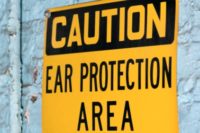Affected by flooding? Be aware of these possible health effects

With many communities experiencing flooding caused by heavy rainfall in recent months, the American Lung Association (ALA) is reminding people that property damage isn’t the only thing to worry about. In addition to containing dangerous substances like sewage, oil and gas, floodwaters can cause mold, which may affect your respiratory health long after the water has receded.
“Excessive rainwater and dampness in homes affected by severe storms and hurricanes may create a dangerous formula for bacteria, viruses and mold,” warns ALA Chief Medical Officer Albert Rizzo, M.D. “These can become airborne and inhaled, putting residents at risk for lung disease. Mold can be linked to wheezing, coughing, and in some cases asthma attacks, and there is evidence that associates mold with respiratory illness in otherwise healthy children.”
Cleanup is vital
Where there is stagnated water or dampness, mold can grow. Cleaning up affected homes and household items after the water recedes is vital to protecting lung health. The ALA recommends following these steps to keep you and your family healthy in the aftermath of flooding:
- Protect yourself before returning to your building. During the cleanup, you risk inhaling dust, contaminants and microorganisms, which are unhealthy for anyone to breathe, but especially risky for children, older adults and people with lung diseases. Wear protective clothing, including gloves, rubber boots and a NIOSH-certified N95 mask to protect you from breathing these particles. NOTE: N95 masks must be fitted and are suited only for adults. Ordinary dust masks cannot provide adequate protection.
- Turn off the electricity and gas at the main location during cleanup. In addition, do not use portable gasoline- or diesel-powered generators, power washers, grills, camp stoves or other gasoline, propane or charcoal-burning equipment and other devices inside. These produce carbon monoxide that can kill occupants if it builds up indoors.
- When in doubt, toss it out! Remove everything that has been soaked by water, including clothing, papers, furnishings, carpet, ceiling tiles and wallboard. Anything that cannot be cleaned and dried and anything porous (like drywall or carpet) that had been in floodwaters for 24 to 48 hours recede must be discarded. Simply drying out water will not remove the bacteria or toxins that can make people sick. Damp buildings and furnishings promote the growth of bacteria, dust mites, cockroaches and mold, which can aggravate asthma and allergies and may cause the development of asthma, wheezing, coughing and other allergic diseases. Dangerous substances in floodwaters can include sewage, chemicals, oil and gas which can saturate materials in the home and give off harmful gases.
- Use soap and water for cleaning, especially to scrub mold off hard surfaces. Do not use bleach, which can make it hard to breathe.
- Consider hiring professional cleaners. Individuals with lung disease should seek help cleaning their homes and workplaces after floods. And if more than 10 square feet of your home is flooded or if water has been in the building for more than one or two days, the U.S. Environmental Protection Agency recommends hiring professional cleaners. Flood waters bring in nasty residue that may contaminate porous building materials. Mold flourishes in this environment. Attempting to clean without professional help may increase the risk of developing respiratory problems from these exposures.
- Do not burn debris or waste, which adds dangerous pollution to the air. Remove it to a designated disposal area.
- Keep an eye on symptoms.It is not uncommon for people to develop health problems after a disaster, even if they’ve never had problems before. Be aware of any breathing problems that may arise, including:
- Coughing, especially at night
- Wheezing or feeling short of breath
- Chest tightness or pain
- Get immediate emergency medical help if fingernails or lips are turning blue or if there is severe chest pain. Both could indicate life-threatening health conditions.
If you are concerned about your family’s lung health and have questions, call 1-800-LUNGUSA to talk to respiratory therapist. More information on how lung health is affected by flooding is available at Lung.org/flood.
Looking for a reprint of this article?
From high-res PDFs to custom plaques, order your copy today!









